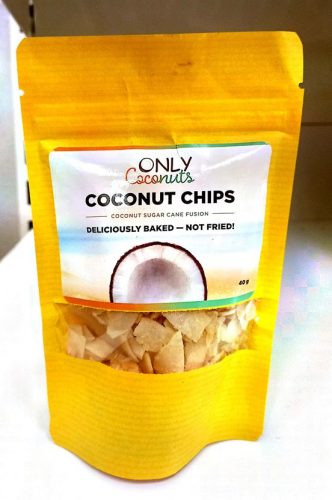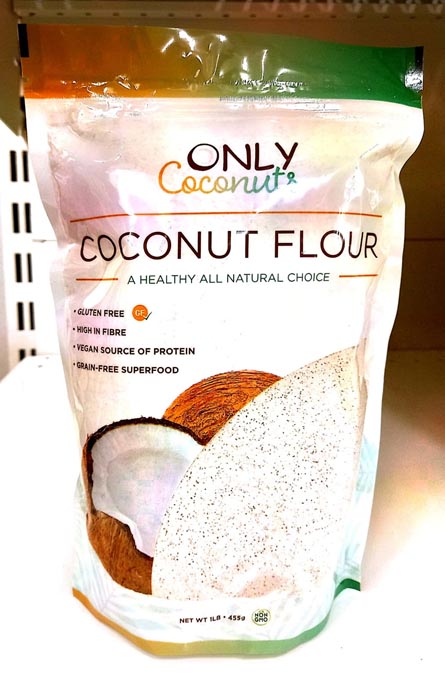Located at Marudi Creek on the Soesdyke/Linden Highway, Precision Global Incorporated, a US$8 million real estate and haulage investment company owned by Ontario-based Guyanese Vishnu Ramdeen has embarked on an agro-processing venture that can not only further enhance the value of the country’s coconut industry but can also significantly further expand its agro-processing sector.
Commissioned since late 2019, the factory rolling out the ‘Only Coconuts’ brand had been ‘waiting out’ the coronavirus pandemic for several months. It is, however, now fully engaged in the process of taking advantage of the country’s coconut industry to manufacture some of the range of products that can be derived from the coconut in an effort to capture local, regional and international markets.
Production has been proceeding at a measured but brisk pace. Three of the company’s planned range of coconut-based products, Virgin Coconut Oil, Coconut Flour and Coconut Chips have already made their respective entries into the local market. These can be found in Supermarkets and other outlets in Georgetown, on the East Coast and East Bank, West Coast of Demerara, Berbice and Linden. The company is currently engaged in seeking to expand its market reach into Essequibo, including Bartica.

Survival, Real Value, Coss Cutters and Mattai’s are among the named Supermarkets where ‘Only Coconut’ products can be found.
Precision Global Incorporated is one of the more recent eye-catching investments in the local coconut industry, a development that coincides with what has been a relatively recent significant global increase in demand for coconut and its by-products. New innovations in the field of coconuts that are leading to enhanced product quality are also factors contributing to the growth of the market.
Precision Global Incorporated’s production complex sits on a thirty-acre plot of land at Marudi on the Soesdyke/Linden Highway and earlier this week a Stabroek Business reporter sat down to speak with the company’s General Manager, Leslie Ramlall, its Vice President (Operations) Celine Davis, Ravi Anand, its Chief Financial Officer, and Vishnu Ramdeen, the company’s owner and Chief Executive Officer who participated virtually.
Ramdeen says that much of his motive for selecting Marudi as the site for the investment had to do with a desire to undertake an investment mission that would serve to enhance the community in which the investment was located by providing jobs for its residents. Marudi, he says, was selected after careful and extensive consideration.
He had noted, he said, that while the largely Amerindian-populated community was located ‘far from the maddening (urban) crowd,” it was within relatively easy reach of the capital and the various key coastal communities. A survey of the community, he says, revealed that its unemployment rate was high. Residents who had jobs were mostly required to make a daily return trek into the capital.
Ramlall says that the company has managed to secure around 85% of its work force from mostly among the women residing at Marudi. The predominance of female staff, he says, reposes in the fact that most of the men employed by the company only remain in its employ for relatively short periods. Those who stay on, men and women, he says, are usually dedicated and committed.
Coconuts for the factory’s operations are secured from plantations on the Essequibo Coast, along the Pomeroon River and in parts of Berbice. Keen to secure high-quality coconuts for its production process the company has established relationships with farmers that extend into discourses with regard to the company’s quality expectations. Contractual arrangements dictate that the farmers transport the coconuts to the factory. Thorough inspections of coconut farms and their horticultural practices are undertaken before deals are ‘sealed.’
Coconut flour is one of the company’s ‘lead’ products.’ Ramdeen explains that in the process of manufacturing its flour “the company uses the whole kernel of the coconut; that include the thin brown skin. If you remove the thin brown skin,” he says, “you are removing some of the nutritional value. If you look at our flour as against some other brands, your will find that our flour is not white, it is slightly brown. If you look at our oil, as well, it has a light golden colour because we are using the entire kernel of coconut.”
The company’s General Manager says that a great deal of attention is usually paid to the inspection of coconut supplies delivered by suppliers.
The coconut shell is used as fuel for the bio-boiler which has had to be subjected to prior inspection by the local Environmental Protection Agency before being put into service.
While the company’s management told the Stabroek Business that they are committed to providing the farmers with fair prices for their coconuts they disclosed that the company’s longer-term plans include the development of its own coconut farm.
At full production ‘throttle’ the plant can utilize up to 100,000 coconuts daily. That, however, is very much for the future since, as the management team explains, the limited scale of the company’s operations, arising out of its still modest market does not require that volume of coconuts.
Mindful of this reality the factory operates for four days out of each week and utilizes the rest of the week to undertake inventory maintenance. Health and safety regulations require the company to undertake cleaning and maintenance exercises every four days.
Operating staff are briefed on the nature of the plant and how it works. The plant is semi-automated and the workers interface with its operations at the beginning of the production process by placing the coconuts on the conveyor for draining and de-shelling. Thereafter an automated production process takes over. There is only a minimal need for skilled workers.
Products listed under the Only Coconut brand are Virgin Coconut Oil, Coconut Flour and Coconut Chips. Going forward, their plan includes the production of Dessicated Coconut. If the management is pleased that their products have established “a presence” on the local market, among their immediate list of priorities is the positioning of their products on the regional and international markets.
The company currently employs 61 persons.





